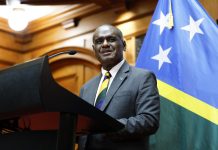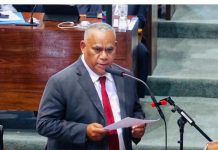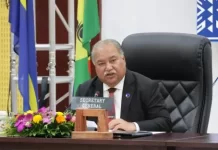The Vanuatu Opposition bloc has filed a case in court challenging President Nikenike Vurobaravu’s decision to dissolve Parliament amid a no-confidence motion against him.
The President dissolved Parliament based on advice from the Council of Ministers (COM).
Former Prime Minister and Member of Parliament for Port Vila, Ishmael Kalsakau, expressed the Opposition’s dissatisfaction with the President’s move, asserting that the dissolution stemmed from a conflict of interest.
Kalsakau claimed the President acted to dismantle the Electoral College, the constitutionally mandated body responsible for removing him, amid allegations against him.
He accused Vurobaravu of acting beyond his constitutional powers.
“This decision reflects a clear conflict of interest,” he said.
“We are here to challenge whether the President has the authority to dissolve Parliament and simultaneously undermine the Electoral College.”
Kalsakau and the Opposition bloc went to the Supreme Court Monday to file their case. They were instructed by the Chief Justice to file their submissions Tuesday, with the court expected to deliberate on the matter in the coming days.
Kalsakau said the unprecedented nature of the case could set a landmark precedent:
“This is the first time such a case has arisen,” he said.
“The court must determine if the President can act unilaterally when his own position is under scrutiny.”
The Opposition maintained that if the court upholds the president’s decision, it will necessitate an election. Conversely, if the decision is ruled unconstitutional, further action against the President could follow.
The Principal Electoral Officer (PEO), Guilain Malessas, voiced concerns about the financial and logistical feasibility of holding a snap election. The costs for national elections are quite expensive.
According to him, conducting a snap election following the dissolution would cost approximately VT80 to 90 million (US$661,099- US$743,736). He said that currently, the office has no funds available for a snap election.
“Additionally, the regulation for registering political parties has not yet been gazetted, which is required before candidates can file nominations.”
He explained that following a dissolution of Parliament, a snap election will be held not less than 30 days and not more than 60 days after the dissolution.
Principal Private Secretary to the President, Clarence Marae, defended the dissolution, saying it was enacted under the Constitution following advice from the COM.
“The PM and Deputy PM presented the unanimous COM decision to the President, urging dissolution. Under the Constitution, the President must act on such advice,” he said.
Marae also dismissed claims that the Opposition was denied an audience with the President, asserting that the President acted strictly within his constitutional mandate.
Before the dissolution, the Opposition had planned to table a motion of no-confidence against the PM Charlot Salwai.
Opposition Leader, Gracia Shadrack, announced at a press conference Monday that the bloc had secured the support of several key parties, including the Union of Moderate Parties Rural Development Party, National United Party, Iauko Group, Vanua’aku Party, People’s Progressive Party, and the Laverwo Party.
The dissolution of Parliament has prevented this motion from being debated, further intensifying the political crisis.
Meanwhile, a political impasse has given way to snap poll in Vanuatu, where voters will be soon asked to elect a fifth government in the last three years.
The Pacific nation has been plagued by instability since the 2022 election, with three prime ministers including the latest, Charlot Salwai.
However, Salwai’s coalition appeared to have lost majority support, with a motion of no confidence scheduled for this week.
Instead, he asked President Nikenike Vurobaravu for a fresh vote, who agreed.
“The council of ministers met and requested the president to dissolve parliament,” Ralph Regenvanu, a Vanuatu MP, told ABC Pacific.
“He has acted very quickly, he has signed the instrument, it’s been gazetted and basically parliament has been dissolved.”
A picture of the president’s mandate was circulated on social media on Monday night.
Vanuatu’s constitution states an election must be held 30 to 60 days following the dissolution of parliament, which would mean a poll between 18 December and 17 January.
The last election was held in October 2022, with no party winning more than 16 per cent of the vote, producing a huge spread of almost 20 parties in the 52-seat chamber.
It is the second straight time the parliamentary term has been ended after just two years instead of the usual four.
Just like the forthcoming election, the 2022 vote was also staged when the then prime minister Bob Loughman requested the dissolution of parliament to head of a no-confidence vote.
Regenvanu, a former climate change minister, said he wanted ni-Vanuatu to choose stability in their elected representatives when they vote next.
“The public is very dismayed, frustrated by the ongoing inability of political leaders to maintain a stable government for obviously more than a year or so because that’s all we’ve seen since the last snap election,” he said.
“I’ll be one that’s standing again.
“We need more members of parliament who are going to think seriously about public funds, transparency, and the need for good leadership.
“We need more MPs concerned with good governance and accountability and I hope that’s going to happen,” he said.













